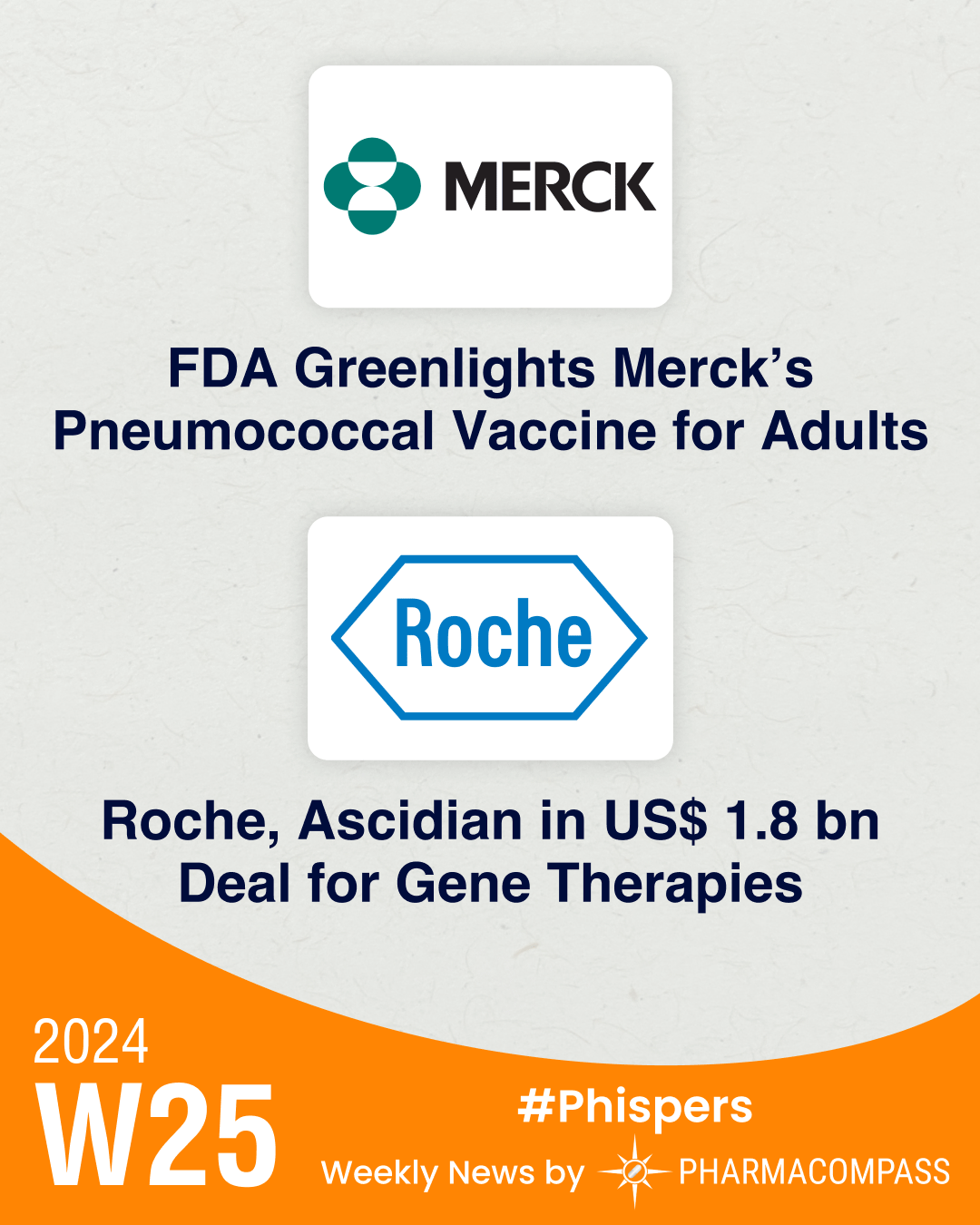
By PharmaCompass
2024-06-20
Impressions: 1,414 Article || 36 Video
This week saw the US Food and Drug Administration (FDA) approve Merck’s next-generation pneumococcal vaccine for adults. The agency also granted accelerated approval to Bristol-Myers Squibb’s Augtyro for adult and pediatric patients with solid tumors.
In deals, Roche has promised up to US$ 1.8 billion to Boston-based startup Ascidian Therapeutics to discover and develop novel gene therapies for difficult-to-treat neurological diseases. The week also saw three deals involving Chinese companies, including AbbVie’s US$ 1.7 billion deal with China’s FutureGen Biopharmaceutical to develop and commercialize a promising treatment for inflammatory bowel disease (IBD).
In trials, Intra-Cellular’s Caplyta scored another remarkable late-stage win for treating major depressive disorder (MDD). And a large study conducted by Stanford Medicine found the risk of CAR-T cell therapies causing secondary cancers to be low.
There were some misses too. Takeda’s seizure drug failed to meet its endpoints in back-to-back late-stage trials. And AstraZeneca’s Truqap failed to prolong the life of patients with hard-to-treat breast cancer.
FDA greenlights Merck’s next-generation pneumococcal vaccine for adults
FDA has approved Merck’s next-generation vaccine designed to protect adults from pneumococcus bacteria that causes serious illnesses and pneumonia. The jab, known as Capvaxive, helped produce an immune response against all 21 variations (serotypes) of the bacteria that it targeted. These 21 strains account for about 85 percent of invasive pneumococcal disease cases in adults aged 65 and above. Pfizer’s Prevnar 20, the current market leader, targets strains that account for about 51 percent of cases in the said age group. Analysts see Capvaxive as a key growth driver for Merck.
BMS’ Augtyro bags tumor-agnostic nod: FDA has granted accelerated approval to Augtyro (repotrectinib) for adult and pediatric patients (over 12 years) with solid tumors that have a neurotrophic tyrosine receptor kinase (NTRK) gene fusion, regardless of where they occur in the body. This makes BMS’ therapy the only FDA-approved treatment option for such tumors.
Roche inks potential US$ 1.8 bn deal with Ascidian to develop novel gene therapies
Roche has promised up to US$ 1.8 billion to Boston-based startup Ascidian Therapeutics to discover and develop novel gene therapies for difficult-to-treat neurological diseases. Ascidian gets an initial payment of US$ 42 million. The startup’s RNA exon editing platform is designed to advance the therapeutic possibilities of RNA medicine and treat diseases not addressed by today's gene editing technologies.
Sanofi, Belharra in immunology deal: Sanofi is collaborating with Belharra Therapeutics in a deal worth up to US$ 700 million including US$ 40 million in upfront and near-term payments. The collaboration will leverage Belharra’s non-covalent chemoproteomics platform to advance the discovery of novel small molecule therapeutics for immunological diseases.
AbbVie to pay up to US$ 1.7 bn to China’s FutureGen for next-gen IBD therapy
AbbVie has agreed to pay China’s FutureGen Biopharmaceutical up to US$ 1.56 billion, including an upfront payment of US$ 150 million, to develop and commercialize a next generation treatment for inflammatory bowel disease (IBD) — FG-M701. Currently in preclinical development, FG-M701 targets TL1A antibody (a clinically validated target in IBD).
Takeda to license Ascentage’s leukemia drug: Japanese drugmaker Takeda has signed an option agreement with China’s Ascentage Pharma for an exclusive license to its promising candidate olverembatinib. This experimental drug is being developed to treat chronic myeloid leukemia (CML) and other hematological cancers. If exercised, the option would allow Takeda to license global rights to develop and commercialize olverembatinib in all territories outside of mainland China, Hong Kong, Macau, Taiwan and Russia. Takeda has paid Ascentage US$ 100 million upfront, and the Chinese drugmaker stands to receive an additional US$ 1.2 billion in milestone payments.
Day One in biobucks deal with MabCare: Day One Biopharmaceuticals has entered into a licensing agreement with China-based MabCare Therapeutics for an experimental novel antibody drug conjugate — MTX-13. The biobucks deal for MTX-13 is worth up to US$ 1.2 billion, if the drug meets all milestones. The drug is being developed for multiple kinds of adult and pediatric cancers.
Intra-Cellular scores late-stage win for depression drug Caplyta
Intra-Cellular’s antipsychotic drug Caplyta (lumateperone) has scored another remarkable late-stage win for treating MDD. After six weeks on the 42 mg daily dose, US participants on Caplyta as an adjunctive therapy experienced a 4.5-point reduction on the Montgomery-Asberg Depression Rating Scale (MADRS) compared to the placebo. The results were notably similar to a previous study conducted worldwide.
The New York City-based biopharma said it is confident lumateperone will become the “drug of choice for patients suffering from MDD who are having an inadequate response to antidepressant therapy.” If approved, Caplyta will compete with AbbVie’s blockbuster antipsychotic drug Vraylar (cariprazine). Like Vraylar, Caplyta is approved for schizophrenia and bipolar disorder, but MDD is reportedly the most lucrative indication. Analysts predict an additional US$ 1 billion in annual peak sales from MDD by 2033.
Takeda’s seizure drug fails to meet main goals in back-to-back phase 3 trials
Takeda’s soticlestat being investigated in two epileptic disorders has failed in phase 3 trials, albeit “narrowly”. The drug was being tested in combination with the standard of care for adults and kids with Dravet syndrome (DS) and Lennox-Gastaut syndrome (LGS) – rare and severe types of epilepsy that cause frequent, long-lasting seizures that usually start in infancy or early childhood. Takeda paid US$ 196 million to Ovid Therapeutics for the global rights to soticlestat. It has promised an additional US$ 660 million in milestone payments.
Astra’s Truqap fails trial for hard-to-treat breast cancer: AstraZeneca’s Truqap (capivasertib), in combination with the common chemotherapy paclitaxel, failed to help patients with hard-to-treat breast cancer live longer. A late-stage study was testing Truqap in volunteers with inoperable triple-negative breast cancer (TNBC) that had spread. TNBC remains among the most challenging forms of disease to treat.
Study finds risk of secondary cancers after CAR-T cell therapy to be low
A large study conducted by Stanford Medicine has found the risk of CAR-T cell therapies causing secondary cancers to be low. According to results published in The New England Journal of Medicine, a 724-patient study saw about 6.5 percent of patients get secondary cancers over a median follow-up period of three years.
Zentalis’ cancer drug put on partial clinical hold: FDA has placed three studies of Zentalis Pharma’s cancer drug — azenosertib — on partial clinical hold. This action was taken after deaths of two participants in a mid-stage study. Azenosertib was being tested against solid tumors in an early-stage study and in patients with a type of ovarian and uterine cancer in two mid-stage studies.
The PharmaCompass Newsletter – Sign Up, Stay Ahead
Feedback, help us to improve. Click here
Image Credit : Phisper Infographic by PharmaCompass license under CC BY 2.0
“ The article is based on the information available in public and which the author believes to be true. The author is not disseminating any information, which the author believes or knows, is confidential or in conflict with the privacy of any person. The views expressed or information supplied through this article is mere opinion and observation of the author. The author does not intend to defame, insult or, cause loss or damage to anyone, in any manner, through this article.”







